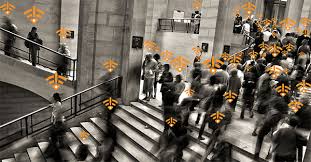
Breaking News
SEMI-NEWS/SEMI-SATIRE: December 28, 2025 Edition
 China Will Close the Semiconductor Gap After EUV Lithography Breakthrough
China Will Close the Semiconductor Gap After EUV Lithography Breakthrough
 The Five Big Lies of Vaccinology
The Five Big Lies of Vaccinology
 Large global study analyzing data from 192 countries has sparked intense debate by suggesting...
Large global study analyzing data from 192 countries has sparked intense debate by suggesting...
Top Tech News
 EngineAI T800: Born to Disrupt! #EngineAI #robotics #newtechnology #newproduct
EngineAI T800: Born to Disrupt! #EngineAI #robotics #newtechnology #newproduct
 This Silicon Anode Breakthrough Could Mark A Turning Point For EV Batteries [Update]
This Silicon Anode Breakthrough Could Mark A Turning Point For EV Batteries [Update]
 Travel gadget promises to dry and iron your clothes – totally hands-free
Travel gadget promises to dry and iron your clothes – totally hands-free
 Perfect Aircrete, Kitchen Ingredients.
Perfect Aircrete, Kitchen Ingredients.
 Futuristic pixel-raising display lets you feel what's onscreen
Futuristic pixel-raising display lets you feel what's onscreen
 Cutting-Edge Facility Generates Pure Water and Hydrogen Fuel from Seawater for Mere Pennies
Cutting-Edge Facility Generates Pure Water and Hydrogen Fuel from Seawater for Mere Pennies
 This tiny dev board is packed with features for ambitious makers
This tiny dev board is packed with features for ambitious makers
 Scientists Discover Gel to Regrow Tooth Enamel
Scientists Discover Gel to Regrow Tooth Enamel
 Vitamin C and Dandelion Root Killing Cancer Cells -- as Former CDC Director Calls for COVID-19...
Vitamin C and Dandelion Root Killing Cancer Cells -- as Former CDC Director Calls for COVID-19...
 Galactic Brain: US firm plans space-based data centers, power grid to challenge China
Galactic Brain: US firm plans space-based data centers, power grid to challenge China
A World Without Wi-Fi Looks Possible as Unlimited Plans Catch On

Unlimited mobile data plans, competing systems pose threats
'You could see a big switch' in consumer behavior: analyst
The Wi-Fi icon -- a dot with radio waves radiating outward -- glows on nearly every internet-connected device, from the iPhone to thermostats to TVs. But it's starting to fade from the limelight.
With every major U.S. wireless carrier now offering unlimited data plans, consumers don't need to log on to a Wi-Fi network to avoid costly overage charges anymore. That's a critical change that threatens to render Wi-Fi obsolete. And with new competitive technologies crowding in, the future looks even dimmer.
"You could see a big switch," said Tim Farrar, founder of Telecom Media Finance Associates Inc. "Your coffee shops may be less compelled to provide Wi-Fi for you now."
In an all-data-you-can-eat world, consumers' use of Wi-Fi at public places like stadiums and airports will drop to a third of all mobile data traffic from about half, Farrar estimates. This means businesses not upgrading public access Wi-Fi as often. Smartphone users might not even turn on their Wi-Fi capability, according to Barry Gilbert, an analyst at researcher Strategy Analytics in Boston.
"At Sprint Corp., where unlimited plans are the norm, customers aren't waiting until they get to a Wi-Fi hot spot to watch the latest video. They are staying on cellular," said Craig Moffett, an analyst at MoffettNathanson LLC. "Customers are rational. When pricing incentives favor Wi-Fi, customers use more Wi-Fi. When pricing incentives shift, so does behavior."
The erosion of Wi-Fi's influence is likely to be slow and uneven. While unlimited data plans make the technology less necessary for phones, many home devices, from a MacBook to an Amazon Echo, still use Wi-Fi to connect to the internet. Wi-Fi also helps fill in gaps in some office buildings and homes that have spotty cellphone coverage.
Some wireless carriers also still rely on Wi-Fi networks to handle a large portion of the growing volume of internet traffic. Putting all of that Netflix-binging and Spotify-listening on cellular networks could strain capacity.



